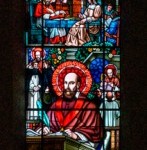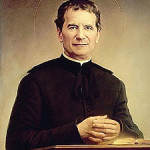 On Sunday we will take the opportunity to chat about the history of the Salesians. We will continue this theme in the next series of newsletters. The reflections are an adaptation of a transcript of a talk by Fr. John A Hardon, S.J. (Used with permission).
On Sunday we will take the opportunity to chat about the history of the Salesians. We will continue this theme in the next series of newsletters. The reflections are an adaptation of a transcript of a talk by Fr. John A Hardon, S.J. (Used with permission).
Fr. Hardon: The Spirituality of St. Francis de Sales.
The written sources are fairly well exhausted in the lineup that I give here. Notice the number of letters that he wrote. Two thousand letters of St. Francis de Sales we still have in existence.
What is the significance of St. Francis de Sales? When we talk about the spirituality of St. Francis de Sales, we are talking about Salesian spirituality.
What does Salesian spirituality mean? The spirituality of whom?
Fr. Hardon: Well now, you are absolutely right. But what saint founded the Salesians? St. John Bosco. Both the men and the women.
First of all, Francis de Sales built on St. Ignatius, notably of course, his spiritual exercises and Ignatius’ stress on human liberty. He found out and he was the one who ever since has been saying, and it is one of those passages in the Introduction to the Devout Life, about the real difference between saints and would be saints. There are those saints who voluntarily cooperated with God’s grace. The has beens, pardon me, the would have beens are those who had the grace but did not cooperate.
Second, his spirituality is a product, first of all, as the bishop who was moreover very active in the Episcopal ministry. He was especially effective in converting many Protestants to the Church. Figures seem sometimes exaggerated but the biographers keep repeating in the neighborhood of 70,000 converts.
As a bishop he was extraordinarily active in the Episcopal ministry particularly in convincing those many Protestants that God loved them. Because you will recall somewhere along the line that in Calvin’s vision of God (and Calvin is the great father and god you might say of classic Protestantism), God for all eternity foresaw whom he would predestine for Heaven and whom he would condemn to Hell; but where Calvin parted with historic Catholicism was to claim that God not only foresaw but foreordained.
And thirdly, that God foreordained some for Heaven and others to Hell irrespective of their conduct. In other words, it is not that those who would go to Hell would go because God foresaw that they would abuse the graces but rather that for His own glory He wanted some to vindicate His Justice and some to vindicate His Mercy. That’s Calvin. De Sales was brought up in that mentality, and combined with the Swiss and French mentality it goes very strong in the direction of Calvinism. In France, as you know, they became the Huguenots. At any rate it’s all very well, we are now talking as Catholics, it’s all very well, to say that God predestined some people for Heaven and others to Hell. If I can subjectively convince myself that while I am one of those that God has predestined for Heaven, that’s great. Then I am happy on earth and I am going to be happy after death. The trouble is that not everybody is all that convinced.
De Sales was not convinced at all. De Sales, therefore, in his own life was discouraged. He was despondent, and he saw that this kind of predestinarianism makes for discouragement and finally despair because, and this is not an unimportant feature of his spirituality, the essence of Hope is not only trusting in God’s Goodness or His Grace, it is also trusting that I have the freedom and the will power to shape my destiny. Does that make sense? That’s why, by the way, he wrote his famous treatise On the Love of God. There are two great books in Christian hagiography on the love of God; Bernard and de Sales. Now de Sales wrote the way he did on God’s love in order to make sure that no one would despair. Not despair either in conjuring up a God who would have the demonic gall of condemning some people irrespective of their merits to Hell . But also of a God who so loves man, who so loves man that He gave man the freedom by which he is to love God in return. Because the love of God, and this is de Sales, the love of God is not only God’s love for us, it is also our voluntary and free and deliberate and responsive love of God.
Source: The History of Religious Life: Great Saints and Their Spiritual Contribution by Fr. John A. Hardon, S.J.
We’ll be talking about the inspiring roots of Salesian spirituality during our chat session on Sunday. Here are some questions that will guild our reflection:
- As we read, St. Francis was highly influenced by the Calvinist notion of double predestination. However, it was precisely this influence that caused him to see clearly God’s true love, the love that allows us to have freedom (not a preordained path to either heaven or hell). How might we explain the balance between freewill and God’s foreknowledge of our eternal destiny?
- Is it surprising to you (or was it your first time learning) that it was St. John Bosco (and not St. Francis de Sales) who started the Salesians?
- What can we learn from St. John Bosco beginning a religious society not in his own name but in the name of another great saint?
- It was the emphasis on God’s love and offer of freedom that inspired St. John Bosco to adapt St. Francis’ teachings to develop a teaching method centered on love instead of punishment. How might we learn from this as we play our part in the New Evangelization?
